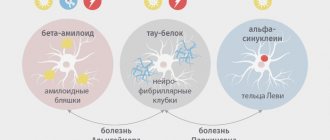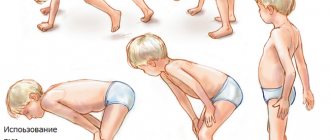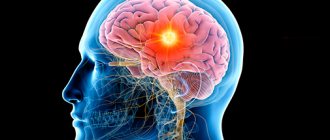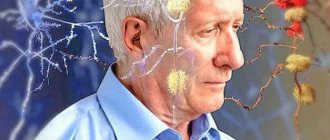| Cachexia | |
| ICD-11 | MG20 |
| ICD-10 | 64. |
| ICD-9 | 799.4799.4 |
| MeSH | D002100 |
| Media files on Wikimedia Commons | |
Cachexia
(ancient Greek κακός - bad, ἕξις - condition;
obsolete "thinness"
[1]) [2] is extreme exhaustion of the body, which is characterized by general weakness, a sharp decrease in weight, activity of physiological processes, as well as changes in mental the condition of a patient who is not actively trying to lose weight. Cachexia physically weakens patients to a state of immobility associated with loss of appetite, asthenia, and anemia, and the response to standard treatment of the underlying disease is usually poor.[3]
Etiology[ | ]
- Sheehan syndrome
- Esophageal stenosis, which makes it difficult for food to enter the stomach;
- Diseases of the gastrointestinal tract (GIT), accompanied by symptoms of impaired digestion and absorption of food, including chronic enterocolitis, celiac disease - sprue, condition after gastrectomy, etc.;
- Psychogenic anorexia;
- Long-term use of psychostimulants
- Amyloidosis;
- Debilitating diffuse connective tissue diseases;
- Long-term intoxication in chronic infectious diseases (brucellosis, tuberculosis, etc.) and purulent processes (abscesses, osteomyelitis);
- Acantholytic pemphigus;
- Severe heart failure;
- Malignant tumors (oncological, in particular, cancer cachexia);
- Metabolic and energy disorders in endocrine diseases, especially in panhypopituitarism (hypothalamic-pituitary insufficiency);
- Adrenal insufficiency;
- Thyroid gland insufficiency;
- Acquired immune deficiency syndrome[4].
Causes of exhaustion
Anorexia nervosa
The condition is more common in young women.
The first signs of the disorder are constant dissatisfaction with your body and the desire to lose weight by any means. Girls with anorexia begin to limit themselves in food, adhere to strict diets, during which they lose up to 10-15% of body weight, and induce vomiting after eating. Rapid exhaustion occurs, the appearance and quality of the body changes - the skin becomes dry and flabby, gathers in folds, hair falls out, and nails begin to peel. There is constant weakness and fatigue. At the same time, the patient continues to consider herself fat and follows a diet. Progressive exhaustion of the body causes severe changes in all internal organs, which indicates a transition to the cachectic stage of anorexia. Weight loss is 20-30% or more, complete refusal to eat is possible. Subcutaneous fat disappears, all ribs, pelvic bones, and collarbones are well contoured. Due to severe metabolic disorders, extensive edema forms, amenorrhea occurs, and libido disappears. When the first signs of anorexia and exhaustion appear, it is important to provide the patient with qualified medical care.
Esophageal stenosis
Narrowing of the lumen of the esophagus and lack of movement of food into the stomach are common causes of exhaustion, which are caused by post-traumatic strictures of the organ and space-occupying formations. At the initial stage, food partially enters the stomach, so the general condition remains satisfactory, weight loss is no more than 5%. As esophageal stenosis progresses, the exhaustion of the body worsens, every attempt to eat ends in vomiting, so patients deliberately refuse to eat. Sharp weight loss is accompanied by swelling and an increase in the size of the abdomen due to the formation of ascites.
Gastrointestinal diseases
Signs of exhaustion occur against the background of dyspeptic symptoms: vomiting several times a day, heaviness in the abdomen after eating, prolonged diarrhea. The symptoms are caused by malabsorption syndrome; in addition, patients reduce food portions, as a result of which the diet becomes depleted of proteins and vitamins. There is rapid weight loss, sagging and hyperpigmentation of the skin. Lack of vitamins causes menstrual dysfunction in women and decreased potency in men; diffuse alopecia and brittle nail plates are characteristic. Exhaustion is often caused by reasons such as:
- Intestinal diseases
: duodenitis, enteritis, enterocolitis. - Pathology of other gastrointestinal organs
: chronic pancreatitis, chronic hepatitis and cirrhosis of the liver. - Bacterial infections
: bacterial overgrowth syndrome (SIBO), some forms of escherichiosis and salmonellosis. - Celiac disease
. - Consequences of surgical interventions
: dumping syndrome after gastrectomy, postcholecystectomy syndrome.
Endogenous intoxication
When toxic compounds and waste products of bacteria accumulate in the blood, typical symptoms of exhaustion appear: progressive weight loss against the background of decreased appetite, deterioration of the skin and hair, and sexual dysfunction. The clinical picture often develops with prolonged subfebrile body temperature, characterized by profuse sweating and severe pallor of the skin. Lability of emotional reactions quickly manifests itself, and neurotic states form. Common causes of body exhaustion:
- Chronic infections
: brucellosis, tuberculosis, chlamydia, mycoplasmosis. - Purulent processes
: abscesses, osteomyelitis, chroniosepsis.
Malignant tumors
Depletion of the body is possible with neoplasms of any location, which is associated with cancer intoxication and increased catabolism (processes of breakdown of substances). Patients lose more than 20% of their body weight in a short time, which is accompanied by complete loss of ability to work and a characteristic appearance: practically no fatty tissue, flabby skin, pale with a yellowish tint, sparse hair, peeling nails. With neoplasms of the gastrointestinal tract, the development of cancer cachexia occurs faster, which is due to mechanical obstacles to the movement of food and impaired absorption of nutrients.
Hypothalamic-pituitary insufficiency
The clinical picture is dominated by weight loss of 2-6 kg per month, combined with general exhaustion of the body. Weight loss occurs evenly, body proportions are preserved. The skin becomes thinner and becomes very dry (like tissue paper), sweating decreases to the point of anhidrosis, hair falls out in the armpits and pubic area. Dystrophic processes in the internal organs are manifested by hypotension, frequent constipation, and amenorrhea. Similar symptoms are observed with exhaustion in women after childbirth, caused by Sheehan syndrome.
Heart failure
A progressive decrease in body weight occurs in the 3rd stage of heart failure. The causes of exhaustion are dystrophic changes in the myocardium and all muscle tissue, concomitant damage to the mucous membrane of the small intestine. At the initial stages, the weight does not change, which is due to severe edema and ascites, then weight loss occurs by more than 15% of the initial values. Weakness and adynamia increase, sometimes patients cannot even get out of bed. The typical appearance of the patient includes a thin face and upper torso, a large abdomen with tight skin due to ascites, and swelling of the legs.
Amyloidosis
Most often, depletion of the body occurs when abnormal amyloid protein is deposited in the gastrointestinal tract. In this case, the process of digestion and absorption of food is disrupted, since the cells of the small intestine do not perform their function. Patients with amyloidosis report significant weight loss accompanied by persistent diarrhea and decreased appetite. When the liver is involved in the process, dull pain in the right hypochondrium after eating and vomiting with bile is characteristic. Exhaustion can be complicated by renal amyloidosis, which is accompanied by severe protein losses.
AIDS
The main reasons for sudden weight loss and emaciated appearance are the addition of secondary bacterial and viral infections. The weight loss of AIDS patients reaches 25% or more of the initial values, the skin looks pale with a waxy tint. Exhaustion is aggravated by the presence of purulent foci in the body and chronic diarrhea. Libido decreases, menstrual function is absent in women. Beginning HIV encephalopathy is manifested by signs of nervous exhaustion - irritability, apathy, then cognitive abilities (memory, attention, understanding of what is happening) deteriorate.
Rare causes
- Genetic enzymopathies
: fructosemia, glucose-galactose intolerance, Hartnup disease. - Collagenoses
: systemic lupus erythematosus, scleroderma, rheumatoid arthritis. - Forced fasting
. - Other endocrine disorders
: decompensated form of diabetes mellitus, chronic adrenal insufficiency, hypothyroidism. - Acantholytic pemphigus
. - Exogenous intoxications
: accidental or professional poisoning with lead, arsenic, mercury. - Vitamin deficiencies
: scurvy, beriberi, pellagra.
Symptoms[ | ]
Symptoms of cachexia include severe weakness, loss of ability to work, and sudden weight loss, often accompanied by signs of dehydration. Weight loss can reach 50% or more.
Subcutaneous tissue decreases sharply or disappears completely, and there are signs of hypovitaminosis (vitamin deficiency). As a result, the skin of patients becomes flabby, wrinkled, turns pale or acquires an earthy-gray tint.
Trophic changes in hair and nails are also present, stomatitis may develop, and severe constipation is typical.
In patients, sexual function decreases; in women, amenorrhea may occur, as the patient’s circulating blood volume decreases.
Glomerular filtration in the kidneys often decreases. Hypoproteinemia, hypoalbuminemia, as well as iron anemia or B12-deficiency anemia are manifested.
Mental disorders are often observed with cachexia. At the beginning of its development, asthenia appears, which causes irritable weakness, tearfulness, and subdepressive mood. With the development of cachexia and asthenia, the adynamic component begins to manifest itself to a greater extent. During exacerbations of the underlying disease, which caused cachexia, clouding of consciousness in the form of amentia, twilight stupefaction, severe or rudimentary forms of delirium, which are replaced by anxious and melancholy states, apathetic stupor, and pseudoparalytic syndrome, may often occur. Despite the favorable outcome of the underlying disease that caused cachexia, prolonged asthenia always remains. In some cases, it is combined with manifestations of psychoorganic syndrome of varying intensity.
Symptoms
The main symptom of cachexia is progressive weight loss. Other symptoms: weakness, dehydration, swelling, lack of subcutaneous fat, dystrophic changes in hair and nails, constipation, cessation of menstruation, anemia (anemia), decreased mobility (up to complete immobility), loss of consciousness.
The development of cachexia can be indicated by a decrease in body mass index (BMI) of less than 18.5 units. This index is easily calculated using the formula BMI = weight (kg) / height ² (m). A normal BMI is from 18.5 to 25.
Treatment[ | ]
Treatment of patients with cachexia is aimed primarily at the underlying disease, but necessarily includes the necessary measures to restore the patients’ nutrition, as well as careful general care for them. The diet must include proteins and fats, vitamins, and it is advisable to use easily digestible foods. For symptoms of impaired digestion and absorption of food, multienzyme drugs are prescribed, such as pancreatin, etc. To relieve patients with cachexia from a serious condition, glucose, electrolytes, vitamins, protein hydrolysates, and amino acid mixtures are administered parenterally. Anabolic steroids are used according to indications. For psychogenic anorexia, treatment is prescribed and carried out by a psychiatrist; Appetite stimulants may be used.
The phenomenon of exhaustion
In the 1990s, social psychologist Roy Baumeister coined the term “ego depletion.” He argued that we have limited cognitive resources, which he called "ego power." During the day, they spend time on self-regulation: resisting temptations, working, suppressing desires, controlling thoughts and beliefs, following established rules. According to Baumeister, this depletes the ego.
Scientists have studied exhaustion in different situations. They first examined self-control. Most often they seduced people with chocolate. It turned out that trying to avoid the offer of a treat weakened people's ability to resist other temptations in the future.
Our self-control, like the amount of fuel in a gas tank, has its limit and runs out with continuous use. By the end of the day we are completely exhausted and can do ridiculous things.
Notes[ | ]
- Skinny // Encyclopedic Dictionary of Brockhaus and Efron: in 86 volumes (82 volumes and 4 additional). - St. Petersburg, 1890-1907.
- Merriam-Webster Dictionary
definition of cachexia - Mitja Lainscak, Matej Podbregar, Stefan Anker.
How does cachexia influence survival in cancer, heart failure and other chronic diseases? (ENGLISH) // Current Opinion in Supportive and Palliative Care. — Lippincott Williams & Wilkins (English) Russian, 2007-12. - T. 1, issue. 4. - pp. 299-305. — ISSN 1751-4258. - doi:10.1097/SPC.0b013e3282f31667. - Rapini, Ronald P.;
Bolognia, Jean L.; Jorizzo, Joseph L. Dermatology: 2-Volume Set (undefined). —St. Louis: Mosby, 2007. - P. 1169. - ISBN 1-4160-2999-0..
Links[ | ]
- Merriam-Webster Dictionary
definition of cachexia - Cachexia // Kazakhstan. National Encyclopedia (Russian). - Almaty: Kazakh encyclopedias, 2005. - T. III. — ISBN 9965-9746-4-0.
| Dictionaries and encyclopedias |
|
| In bibliographic catalogs |
|











